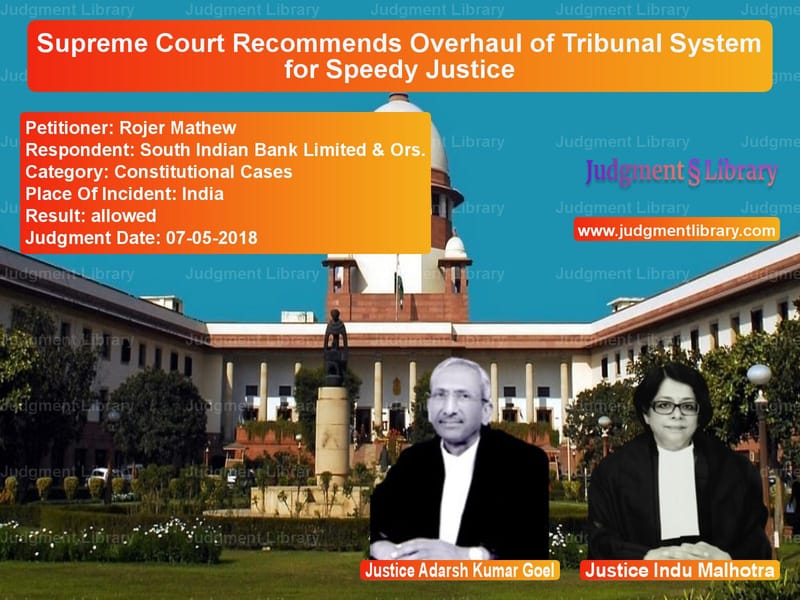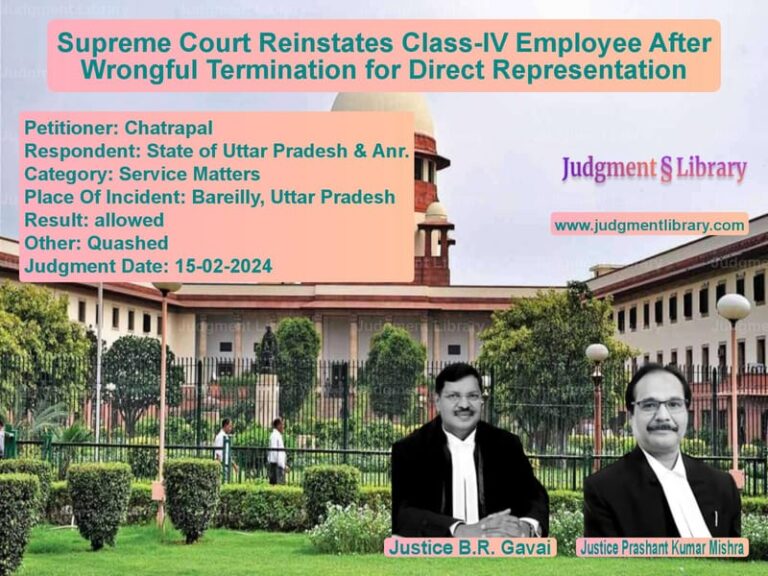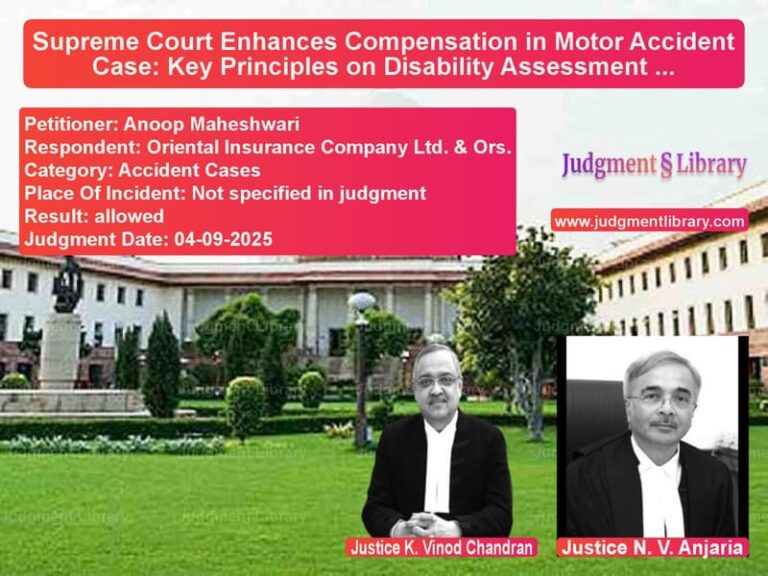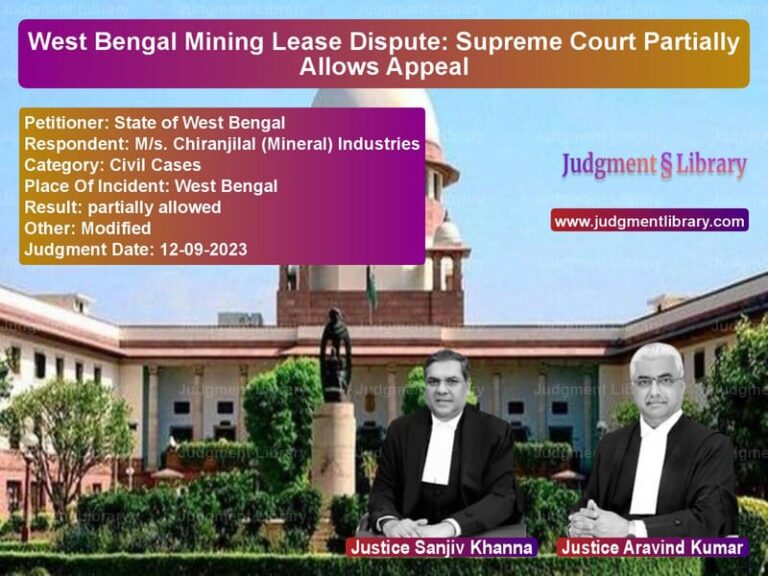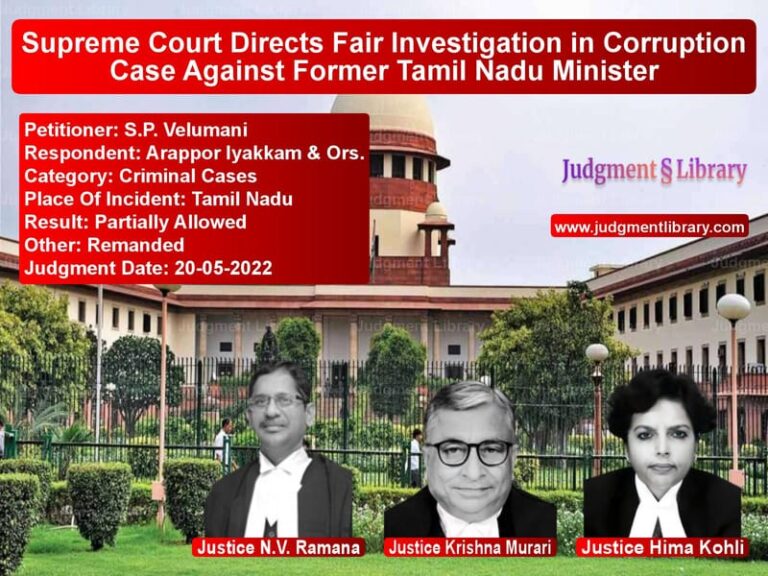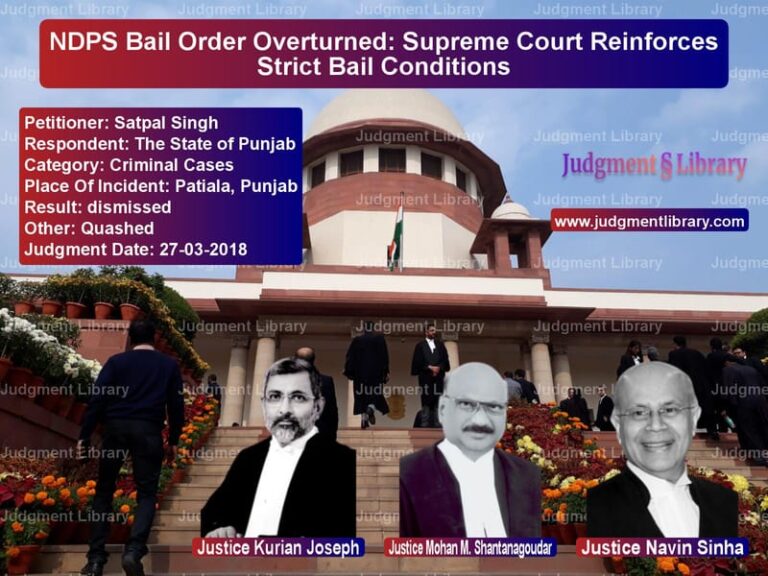Supreme Court Recommends Overhaul of Tribunal System for Speedy Justice
The case of Rojer Mathew vs. South Indian Bank Limited & Ors. deals with the urgent need for restructuring India’s Tribunal system. The Supreme Court examined whether tribunals in their current form align with the constitutional principles of separation of powers, independence of the judiciary, and access to justice.
Tribunals were originally created to reduce the burden on courts and provide quick and inexpensive justice. However, over time, several issues have emerged, such as inefficiency, inadequate judicial oversight, and lack of independence. In this case, the Supreme Court analyzed various expert committee reports and past judgments to recommend key reforms.
Background of the Case
The petitioner, Rojer Mathew, challenged the structure and functioning of tribunals, arguing that they do not offer a fair and independent adjudication system. Several key issues were raised:
- Whether tribunals ensure judicial independence as mandated by the Constitution.
- Whether direct appeals from tribunals to the Supreme Court restrict access to justice.
- Whether administrative control over tribunals by government ministries affects fairness.
- Whether short-term appointments of tribunal members undermine judicial efficiency.
- Whether there should be a separate oversight body for tribunals.
The Supreme Court referred to multiple past judgments, including R.K. Jain vs. Union of India, L. Chandra Kumar vs. Union of India, and Madras Bar Association vs. Union of India, to analyze the issues.
Key Legal Issues Considered
The Supreme Court identified four primary concerns with the tribunal system:
- Lack of judicial independence in tribunal appointments.
- Restricted access to justice due to tribunals having only one seat in Delhi.
- Need for a national oversight body for uniform service conditions of tribunal members.
- Need to restructure tribunals so that they are as effective as regular courts.
Arguments of the Parties
Petitioner’s (Rojer Mathew) Arguments
The petitioner argued:
- Tribunals should have the same level of independence as courts.
- Tribunal members should be appointed in the same manner as High Court and Supreme Court judges.
- Many tribunals do not inspire public confidence due to executive control over their administration.
- Short-term appointments of tribunal members weaken their efficiency and credibility.
- There should be a National Tribunal Commission (NTC) to oversee recruitment, service conditions, and accountability.
Respondent’s (South Indian Bank & Others) Arguments
The respondents contended:
- The tribunal system has significantly reduced the backlog of cases in courts.
- Executive control over tribunals is necessary for their proper functioning.
- The current system of direct appeals to the Supreme Court ensures speedy resolution of disputes.
- Tribunals serve a specialized role and should not be treated as equivalent to regular courts.
Supreme Court’s Observations
The Supreme Court noted that tribunals were created to reduce case backlog but have often failed to function efficiently. It identified several deficiencies:
- Tribunal members lack judicial training and legal expertise.
- Many tribunals function under government ministries, leading to conflicts of interest.
- Short-term appointments of tribunal members affect consistency in decision-making.
- Direct appeals to the Supreme Court make justice expensive and difficult to access.
Supreme Court’s Ruling
The Supreme Court issued broad recommendations for tribunal reforms, stating:
“We broadly approve the concept of having an effective and autonomous oversight body for all the tribunals. Such a body should be responsible for recruitments and oversight of functioning of members of the tribunals.”
The Court suggested:
- Setting up a National Tribunal Commission (NTC) to handle appointments, service conditions, and oversight.
- Replacing short-term appointments with long-term judicial careers in tribunals.
- Establishing tribunal benches in multiple locations instead of just Delhi to improve access to justice.
- Ensuring High Courts have supervisory jurisdiction over tribunal decisions instead of allowing direct appeals to the Supreme Court.
Key Takeaways from the Judgment
- Tribunals must maintain the same judicial independence as regular courts.
- Executive control over tribunals should be removed to ensure fair adjudication.
- Tribunal members should be selected through national competition, similar to judicial appointments.
- A National Tribunal Commission should be created to oversee all tribunals.
- Tribunals should have benches in multiple states instead of being centralized in Delhi.
Conclusion
The Supreme Court’s judgment is a landmark ruling that highlights the urgent need for tribunal reforms in India. It underscores the importance of judicial independence, better oversight, and improved access to justice.
The decision serves as a foundation for future legal and administrative changes to make tribunals more efficient, fair, and accessible to all litigants. The recommendations, if implemented, could significantly enhance the credibility of the tribunal system in India.
Petitioner Name: Rojer Mathew.Respondent Name: South Indian Bank Limited & Ors..Judgment By: Justice Adarsh Kumar Goel, Justice Indu Malhotra.Place Of Incident: India.Judgment Date: 07-05-2018.
Don’t miss out on the full details! Download the complete judgment in PDF format below and gain valuable insights instantly!
Download Judgment: Rojer Mathew vs South Indian Bank Li Supreme Court of India Judgment Dated 07-05-2018.pdf
Direct Downlaod Judgment: Direct downlaod this Judgment
See all petitions in Separation of Powers
See all petitions in Public Interest Litigation
See all petitions in Fundamental Rights
See all petitions in Judgment by Adarsh Kumar Goel
See all petitions in Judgment by Indu Malhotra
See all petitions in allowed
See all petitions in supreme court of India judgments May 2018
See all petitions in 2018 judgments
See all posts in Constitutional Cases Category
See all allowed petitions in Constitutional Cases Category
See all Dismissed petitions in Constitutional Cases Category
See all partially allowed petitions in Constitutional Cases Category

